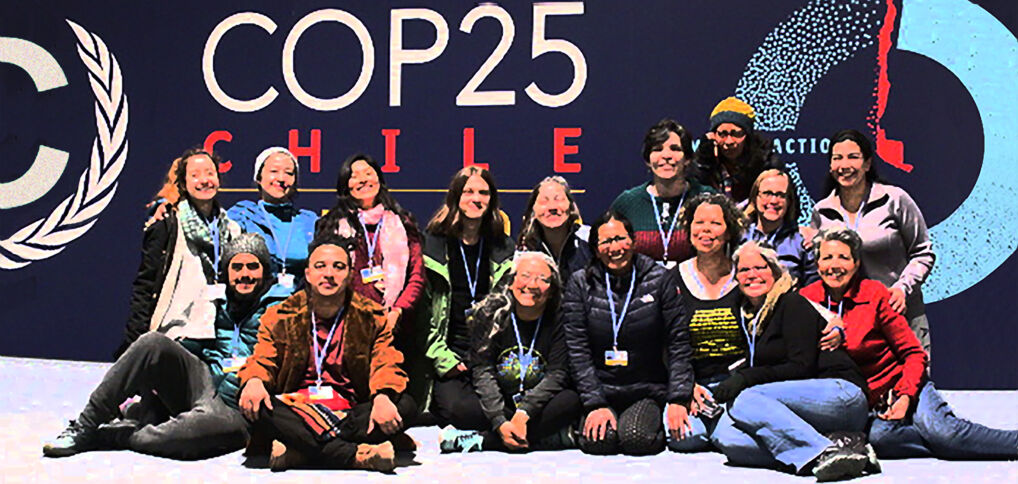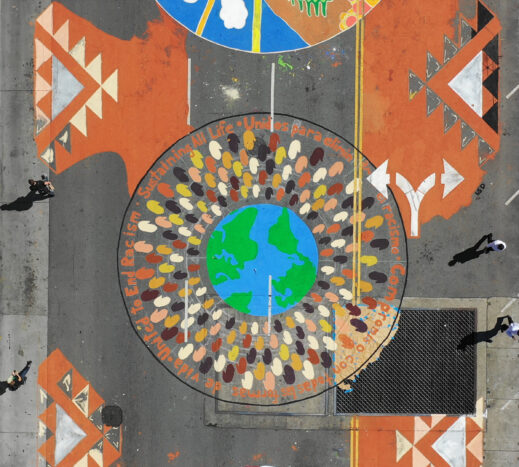
What do we think about the environmental crisis?
View this resource
as a PDF >>
****
View this resource
in French >>
****
View this resource
in Spanish >>
We applaud and support the excellent work being done by many environmental organizations, Indigenous organizations, and the environmental justice movement. These efforts have often had little support as they worked for the benefit of all.
Carbon emissions generated by the extraction, processing, transport, and burning of fossil fuels; the management of fossil fuel waste; and the destruction of forests, grasslands, and other carbon sinks; are trapping heat in the atmosphere. Our dependence on fossil fuels and other unsustainable practices are damaging the natural ecosystems on which our well-being and lives depend. Almost all of this is driven by the profit motive built into our economic systems.
The vast majority of scientists agree that greenhouse gas (GHG) pollution (primarily from carbon dioxide and methane) is the cause of global climate change.
What is happening in Latin America?
GHG pollution is already causing severe climate change worldwide. Rainfall patterns are changing. Temperatures are rising. Many areas are experiencing more frequent and more severe weather events.
There is a food crisis. It is caused by droughts, floods, forest fires, pollution of aquifers, and rising sea levels. As a result, people are displaced, many people die, and economies suffer.
Environmental destruction and climate change have a disproportionate effect on working-class, poor, Indigenous, and Global Majority 1 people.

are based on meeting the real needs of human beings and other forms of life. We need systems that protect living beings and restore the environment.
Our peoples have been subjected to colonialism, genocide, imperialism, racism, classism, sexism, and other oppressions. All of this limits us. It obstructs us from building the needed global movement of thousands of united people to make the changes that are needed.
Our proposal
We support the work of groups and organizations dedicated to achieving these goals. In addition, we offer tools that support people in their organizing efforts.
Distress and oppression set us against each other, when in fact we have common interests. They make a unified response to the environmental crisis very difficult.
It is possible to free ourselves from the effects of distressing experiences and societal oppression by exchanging effective listening with each other. Doing this can eliminate many of the difficulties of working collectively and make it easier to build alliances. By freeing ourselves from this harm, we can organize ourselves more effectively and take decisive action. We can give hope to people who have been overcome by denial, passivity, and fatalism in regard to the climate crisis.It must be emphasized that the environmental crisis cannot be solved without ending the genocide of Indigenous people, racism, classism, and sexism. Sustaining All Life provides tools for effective work on genocide and oppression.
Challenges we face in Latin America
We are under great pressure from transnational and national companies that seek to gain control of our continent’s natural resources.
Illegal logging degrades forests, which leads to loss of biodiversity and the desertification of large areas of land. Local communities lose their livelihoods as a result.

Access to water is a sensitive issue in our countries. Industries are permitted to install hydroelectric projects that do not take into account the environmental impact and the needs of the inhabitants.
The world market demands minerals, fossil fuels, and agricultural raw materials, creating serious problems in Latin America. Companies that operate on the basis of an unsustainable, violent, and voracious model are allowed to operate in our countries.
Economic growth, considered to be the supreme good, has been imposed on us. It takes precedence over human rights, people’s self-determination, and the preservation of the environment.
People who defend the environment and oppose climate change face hostile authorities, organized crime, and armies and paramilitary groups. Laws are changed to favor industries and criminalize peaceful protest. Attacks on and killings of environmental activists are commonplace and well-known.
The capitalist economic system promotes competition between nations and corporations for resources. Capitalism demands growth and profit. There is little respect for life forms and the Earth.
What role does oppression play?
Oppression is the systematic mistreatment of a group of people with another group acting as the agent of oppression. Every human being is targeted by societal oppression at some point in their life. The effects of oppression make it more difficult to address and end climate change.
When we are oppressed we come to believe (“internalize”) the messages of oppression. We may feel we are not smart enough or powerful enough to challenge authority or assume leadership in society.
Many of us feel discouraged when our efforts to effect change are not successful. It is difficult to feel motivated to be an agent of change when we are feeling discouraged, powerless, and less intelligent than others, when we have been left alone and do not see that our interests are the same as those of others.
Oppression has the effect of dividing us. It makes us compete with and mistrust people who would be our natural allies. We become unable to see our common interest in working for a just and sustainable future. Capitalism depends on and uses the mechanism of oppression to keep people divided.
Capitalism is a system based on assumptions that have led to the destruction of the environment. These assumptions include: (1) that economic growth is essential, (2) that capitalism is the best and only system possible, (3) that all problems, including the environmental crisis, can be solved by creating “solutions” that yield profits for corporations and the ruling classes.
How do we dismantle that which immobilizes, discourages, and divides us?

Facing what is happening to us and the environment is difficult and overwhelming. Many of us become desensitized to the problem. We stop paying attention to facts and environmental problems and turn our minds to other issues.
However, it is possible to face the entire reality of our situation. It is possible to regain our connection to all forms of life. To do this we need to hear from one another. We need to share our feelings of sadness, fear, and anger. When not released, these feelings can prevent us from facing these issues and working to resolve them.
Women play leadership roles in many environmental movements. However, women still experience racism, sexism, and lack of respect for their thinking, all of which slows down the progress of our movements.
To move forward we need to understand and support the work being done by Indigenous and environmental justice movements. We need to make alliances with others who are working on the climate emergency. We need to address and heal the damage done to us as individuals by racism, classism, and other oppressions.
How can we recover from the effects of oppression?
Many of our accumulated emotional hurts are the result of oppression (for example, racism, classism, and sexism).
The messages of oppression “justify” the systematic denying of resources to certain groups and targeting them with violence. The groups are treated as inferior, less intelligent, less capable, and as if they should be controlled by the dominant groups.
Oppressive messages are unconsciously absorbed by oppressed people as if they were an authentic image of themselves. As a result, the group members come to believe and to spread the misinformation about themselves and others in their group. Treating ourselves and others in our group according to the messages dictated by oppression is what we call “internalized oppression.”
It is also important to share and release painful feelings about the damage being done to our planet and its life forms—about the havoc that climate change and environmental degradation have wrought on people all over the planet, and about the many species that we have already lost or that are in danger of extinction.
1 Indigenous peoples and the peoples of Africa, Asia, the Pacific Islands, the Caribbean, and Latin America, and those descended from them, are over eighty percent of the global population. These people also occupy most of the global land mass.
Using the term “Indigenous and Global Majority (IGM)” for these people acknowledges their majority status in the world and interrupts how the dominant (U.S. and European) culture assigns them a minority status.
Many Indigenous and Global Majority people living in dominant-culture countries have been assimilated into the dominant culture—by force, in order to survive, in seeking a better life for themselves and their families, or in pursuing the economic, political, or other inclusion of their communities. Calling these people “Indigenous and Global Majority” contradicts the assimilation.


